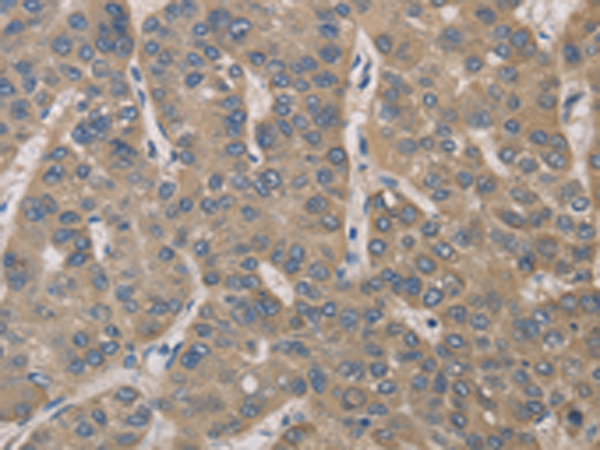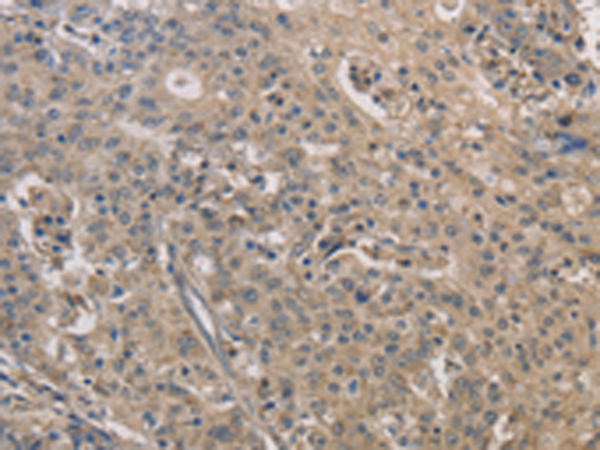

| WB | 咨询技术 | Human,Mouse,Rat |
| IF | 咨询技术 | Human,Mouse,Rat |
| IHC | 1/50-1/200 | Human,Mouse,Rat |
| ICC | 技术咨询 | Human,Mouse,Rat |
| FCM | 咨询技术 | Human,Mouse,Rat |
| Elisa | 1/2000-1/5000 | Human,Mouse,Rat |
| Aliases | IPD1; REN64; IRAK-4; NY-REN-64 |
| Host/Isotype | Rabbit IgG |
| Antibody Type | Primary antibody |
| Storage | Store at 4°C short term. Aliquot and store at -20°C long term. Avoid freeze/thaw cycles. |
| Species Reactivity | Human, Mouse |
| Immunogen | Fusion protein of human IRAK4 |
| Formulation | Purified antibody in PBS with 0.05% sodium azide and 50% glycerol. |
+ +
以下是3篇与IRAK4抗体相关的文献摘要概括:
1. **文献名称**: *IRAK4 signaling in autoimmunity and cancer*
**作者**: Cohen P. et al.
**摘要**: 该研究综述了IRAK4在TLR/IL-1R信号通路中的核心作用,提出其抑制剂或抗体在治疗自身免疫疾病(如类风湿性关节炎)和部分血液肿瘤中的潜力,并讨论了靶向IRAK4的抗体开发进展。
2. **文献名称**: *Targeting IRAK4 with small-molecule inhibitors and antibodies for inflammatory diseases*
**作者**: Wang Y. et al.
**摘要**: 研究比较了IRAK4小分子抑制剂与单克隆抗体的作用机制,实验表明特异性IRAK4抗体能有效阻断MyD88依赖的炎症通路,减轻小鼠模型中的脓毒症和皮肤炎症反应。
3. **文献名称**: *Structural basis for IRAK4 inhibition by clinical antibody candidates*
**作者**: Liu S. et al.
**摘要**: 通过冷冻电镜解析IRAK4与治疗性抗体的复合物结构,揭示抗体如何通过结合激酶结构域抑制其活性,为优化抗体药物设计提供了结构生物学依据。
注:以上文献信息为示例,实际文献需通过PubMed或Web of Science等平台检索确认。建议使用关键词"IRAK4 antibody"+"therapeutic"或"IRAK4 inhibitor"获取最新研究。
The interleukin-1 receptor-associated kinase 4 (IRAK4) is a serine/threonine kinase critical in innate immune signaling pathways, particularly those mediated by Toll-like receptors (TLRs) and interleukin-1 receptors (IL-1Rs). Upon receptor activation, IRAK4 is recruited to myeloid differentiation primary response 88 (MyD88) adaptor complexes, where it phosphorylates downstream kinases like IRAK1 and IRAK2. initiating signaling cascades that activate NF-κB and MAPK pathways. These pathways drive pro-inflammatory cytokine production and immune responses. IRAK4 deficiency in humans is linked to recurrent bacterial infections, highlighting its role in host defense. Conversely, dysregulated IRAK4 activity is implicated in autoimmune diseases (e.g., rheumatoid arthritis), chronic inflammation, and cancers, making it a therapeutic target.
IRAK4 antibodies are essential tools for studying its expression, activation, and interaction partners. They are widely used in techniques like Western blotting, immunohistochemistry, and co-immunoprecipitation to explore IRAK4's role in disease models or immune responses. Therapeutic IRAK4 inhibitors, including small molecules and monoclonal antibodies, aim to suppress hyperactive signaling in inflammatory disorders. Recent research also investigates IRAK4 degradation strategies (e.g., PROTACs) for enhanced specificity. Notably, IRAK4-targeting agents are in clinical trials for conditions like lymphoma and autoimmune diseases, underscoring its translational relevance. However, challenges remain in balancing therapeutic efficacy with potential immunosuppression risks.
×